Ghana, the International Monetary Fund and the recovery path
Armstrong D. Opoku, London, UK
September 3rd, 2024
The restoration of macroeconomic stability, of debt sustainability and a return to economic growth are the priorities of Ghana’s 2024. An effective and successful implementation of the International Monetary Fund (IMF) reform program will steer towards those goals. On May 2023, Ghana and the IMF signed a US$3 Billion Extended Credit Facility Arrangement (ECF). The ECF is a three-year program of structural reform (2023-2026), which aims to restore fiscal stability, debt sustainability and reinforce social safety net. The agreement follows a decision by Ghana to suspend debt payment on December 19th, 2022. Since then, Ghana has implemented a domestic debt restructuring program. After this restructuring, the government reached debt restructuring agreements with the Paris Club for US$1.394 billion and with Eurobond bondholders for US$13.1 billion debt.
Debt continues to dominate the government's recovery policies. According to the Ministry of Finance, gross public debt at the end of Q2-2023 was US$52.31 billion (GH₵575.52 billion), representing 67.3 percent of revised projected GDP for 2023. This comprised external debt of US$29.87 billion (GH₵328.61 billion) with 38.4 percent of GDP, and domestic debt of US$22.44 billion (GH₵246.91 billion) making 28.9 percent of GDP1.
Economic performance in 2024 (Q1-Q3)
Ghana's macroeconomic economic indicators have recorded some improvements in 2024. Growth rates are higher than expected and stronger than in 2023. In Q1 2024, Ghana's economy grew by 4.8 percent in the first quarter of 2024, which was the strongest growth since Q4 2021. In Q2 2024, it grew 6.9 percent in the second quarter of 2024, which was also the highest quarterly GDP growth in five years. Inflation dropped to 20.9 percent in July 2024 from 22.8 percent in June 2024, driven by a slight decrease in both food and non-food prices. In September 19, the new Minister of Finance Mohammed Amin Adam announced a GDP growth rate of 6.9 percent for Q2 of 2024, which is the highest quarterly GDP growth recorded in the past 5 years.
The Ghanaian Cedi remains volatile despite some gains against major trading currencies during the first quarter. The Bank of Ghana maintains a tight monetary policy while recording the positive effects of the gold-for-oil program. The extractive sector (mining, oil and gas), construction, information and communication technology and also inward remittances are the main drivers of these macroeconomic improvements. Gold has risen 45.5 percent since July 2023 while crude oil has remained above US$66 a barrel, despite turmoil in the Middle East and the prolonged war in Ukraine.
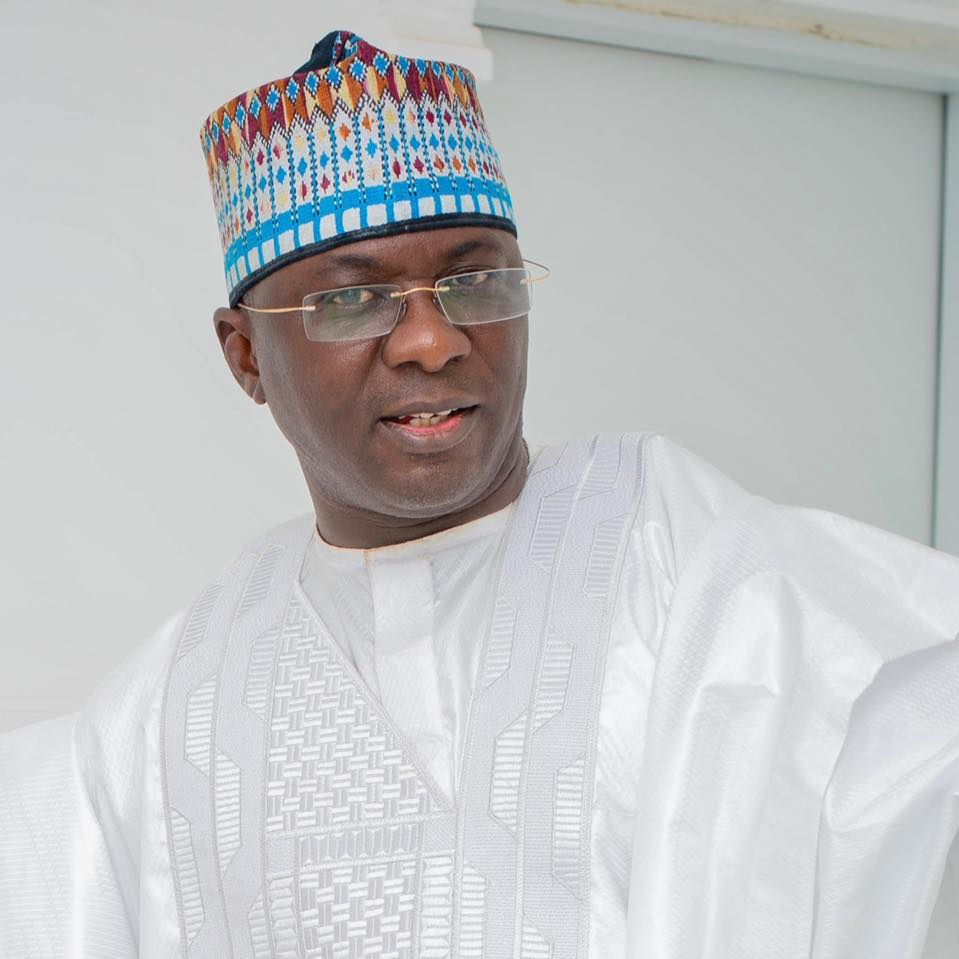
Minister of Finance, Mohammed Amin Adam
ECF review
In October 4, 2024, Ghanaian authorities and the IMF staff reached staff-level agreement on economic policies and reforms to conclude the third review of the 36-month ECF-supported program. Upon completion of this third review, the IMF Board will probably authorize a disbursement of US$360 million, bringing the total IMF financial support disbursed under the arrangement, since May 2023, to roughly US$1,920 million. The IMF estimates that Ghana’s performance under the program has been ‟generally satisfactory”.
It notes that ‟fiscal performance in 2024 has so far been strong, and Ghana is on track to achieve a primary surplus on a commitment basis of 0.5 percent of GDP, despite emerging spending pressures from the recent drought in the northern regions and difficulties in the energy sector”. However, the Fund warned about expenditure control in the run-up to December 2024 presidential elections.
The ECF is a lifeline for Ghana. This IMF program represents 20 percent of Ghana’s balance-of-payments financing needs in 2023-26, which amounts to US$15 billion. Another benefit of the ECF for Ghana will come from debt restructuring agreements, which will deliver US$10.5 billion in external debt service relief over the program period. The ECF will also unblock US$1.6 billion in budget and balance-of-payments financing from World Bank.
The IMF continues to urge Ghana to align any agreement with official creditors with ECF targets to provide assurances to investors, when Ghana recovers and begins to eye the international financial markets at the end of the program.
Outlook
Revenue and expenditure
The 2024 budget sought to improve revenue mobilization. The government initially projected that total revenue and grants will reach 16.7 percent of the GDP, representing an increase of 30.8 percent from the 2023 mid-year budgeted revenue. Ghanaian authorities also expect total expenditures (on a commitment basis) to reach 21.6 percent of GDP, which will represent a 19.4 percent increase compared to the 2023 mid-year budgeted expenditure. The government has maintained investments in social protection programs, including school feeding program and allocations to communities affected by floods the Oti, Savannah, and Bono-East Region.
The government targets a revenue to GDP ratio of 18.2 percent (with non-oil at 16.6 percent) at the end of the ECF program in 2026. This will represent an increase, but still below the government target of 20 percent. An increase of non-oil revenue, a stabilization of social spending and a reduction of the primary fiscal balance are parts of the performance targets of the program. To achieve the target, the Ghana Revenue Authority has introduced additional measures to limit revenue leakages and to widen the tax base.
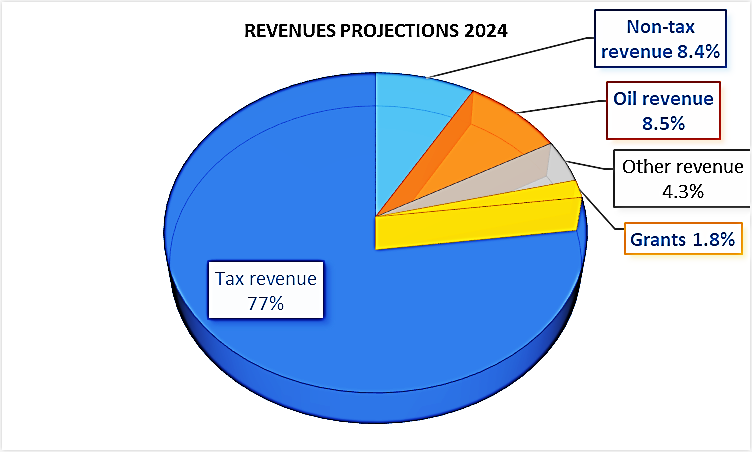
Ministry of Finance, Dec. 2023
Ghana's dependence on import and expecially of food import continues to expose the country to external risks. The IMF warned that the recent dry spell affecting the Northern regions is expected to adversely impact agricultural output, potentially constraining growth and adding pressure on food prices for the remainder of the year.
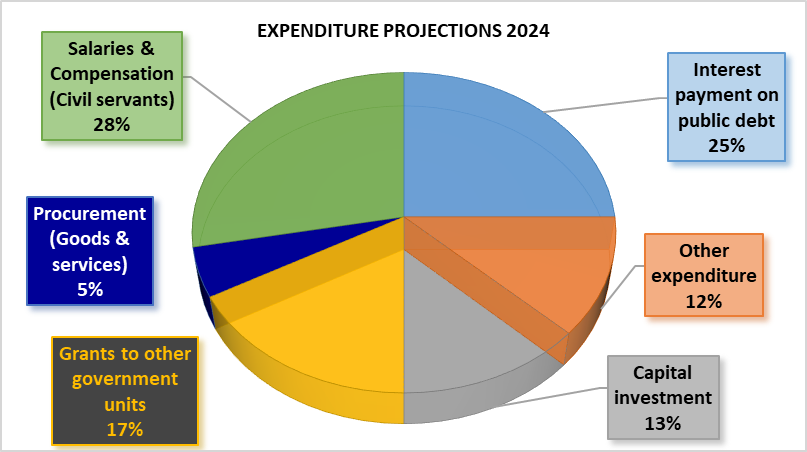
Ministry of Finance, Dec. 2023
Economic growth and inflation
The country projects consecutive growth of the GDP and also a fall in inflation throughout the remaining 30 months of the program. Fiscal deficit is a key performance criterion of the ECF. On a commitment basis, the government project a moderation from 4.9 percent of GDP in 2024 to 2.4 percent by 2027.
The government expects the GDP to grow at an average rate of 2.8 percent in 2024-2027, rising to over 5.0 percent from 2027 onwards. It also wants to maintain inflation on a downward slope. Inflation fell to 26.4 percent at the end of the fourth quarter of 2023, from 54.0 percent at the end of the second quarter of 2022. Authorities project a further fall of inflation and are targeting 15.0 percent from 2025 onwards.
The instability of the Cedi against the US Dollar, the Euro, and the British Pound is a cause for uncertainty. Currency depreciation translates into lower earnings from export and high outlays for debt interest payments. The Cedi staged a recovery during the first two quarters of 2023. But, it depreciated by 6.4 percent (cumulatively) between February and December 2023.
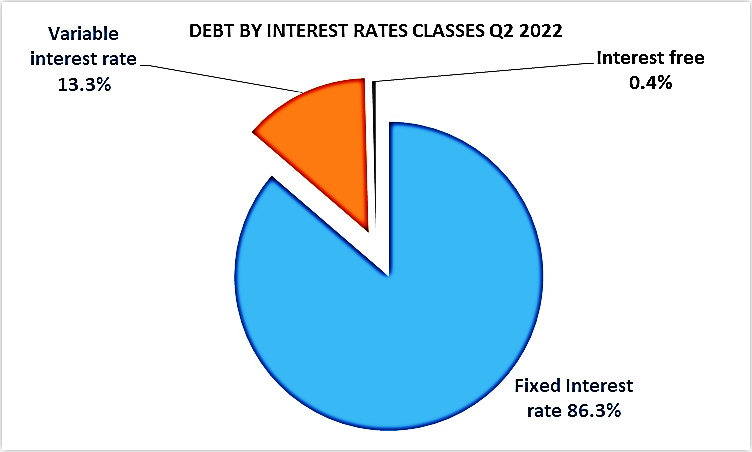
Ministry of Finance, Dec. 2023
According to the Ministry of Finance, the interest rate structure of the external debt portfolio includes fixed-rate debt, which accounted for 86.3 percent at the end of Q2-2022. Variable interest rate debt accounted for 13.3 percent. Finally, interest-free debt which has subsidized loans from bilateral creditors, accounted for 0.4 percent during the same period. At the end of Q2-2022, 71.4 percent of the country’s debt was in US dollars, 18 percent in Euro. Debt denominated in Chinese Yuan (CNY), GBP and Japanese Yen (JPY) represented 3.2 percent, 1.8 percent and 1.7 percent of the portfolio. The remaining 4.0 percent were a mix of other currencies.
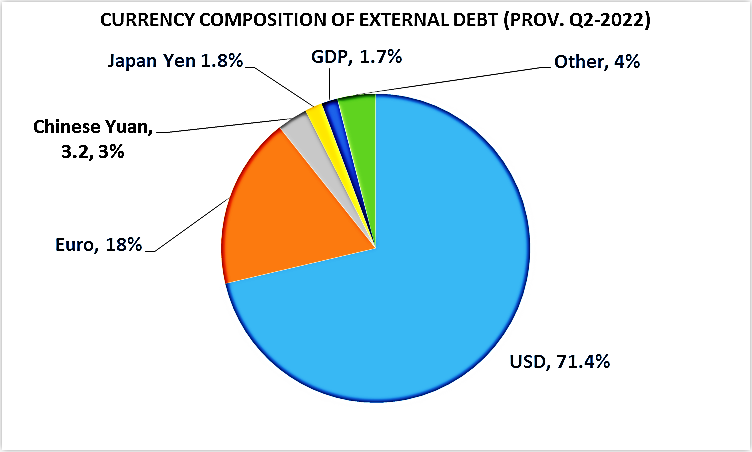
Ministry of Finance, Dec. 2023
Related Articles
BIBLIOGRAPHY
1❩ Ministry of Finance (2023): Public Debt Statistical Bulletin, Second Quarter 2023 https://mofep.gov.gh/sites/default/files/basic-page/Debt-Statistics-Bulletin-2023-Q2.pdf
1❩ Paris Club (2022): The Paris Club releases comprehensive data on its claims as of 31 December 2022. https://clubdeparis.org/en/communications/press-release/the-paris-club-releases-comprehensive-data-on-its-claims-as-of-31-6
2❩ IMF (2023):IMF Reaches Staff-Level Agreement on the First Review of the Extended Credit Facility and Conducts Discussions of the 2023 Article IV Consultation with Ghana - https://www.imf.org/en/News/Articles/2023/10/05/pr23339-ghana-imf-reaches-sla-1st-rev-ecf-conducts-discussions-2023-art-iv-consult#:~:text=Upon%20completion%20of%20the%20Executive,(about%20US%241%2C200%20million).
3❩ IMF (2023): Ghana: Request for an Arrangement Under the Extended Credit Facility-Press Release; Staff Report; and Statement by the Executive Director for Ghana - https://www.elibrary.imf.org/configurable/content/journals$002f002$002f2023$002f168$002farticle-A001-en.xml?t:ac=journals%24002f002%24002f2023%24002f168%24002farticle-A001-en.xml
4❩ Ken Ofori-Atta (2021): The Budget Statement and Economic Policy: of the Government of Ghana for the 2022 Financial Year - https://mofep.gov.gh/sites/default/files/news/2022-Budget-Statement.pdf
5❩ Ghana national budget 2024.
